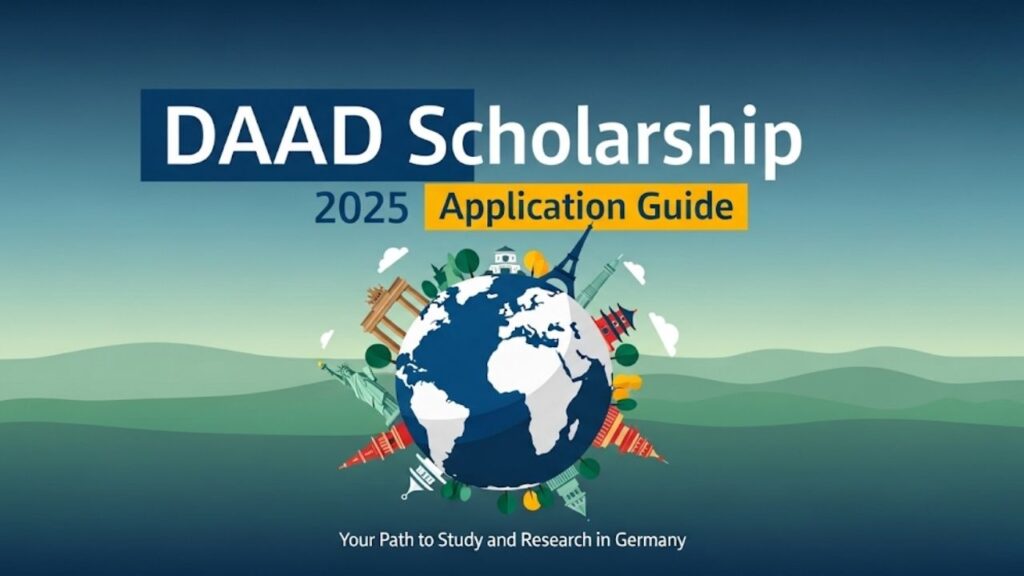Dreaming of studying in Germany? The DAAD (Deutscher Akademischer Austauschdienst) scholarships are a golden ticket for thousands of international students, offering a chance to pursue master’s, PhD, and research programs at some of the world’s most reputable universities, all with generous financial support. But navigating the DAAD scholarship application process can feel like a complex maze. From deciphering the specific requirements for different programs to crafting a compelling application, it can be a lot to take in. That’s why we’ve created this comprehensive guide: to break down the key eligibility criteria and requirements for DAAD scholarships in 2025 and empower you with the knowledge to build a standout application.

Securing a DAAD scholarship is a challenging but incredibly rewarding process. It requires careful planning, meticulous attention to detail, and a compelling narrative that showcases your passion and potential. By understanding the eligibility criteria, preparing your documents thoughtfully, and starting your application well in advance, you can significantly boost your chances of success. Your journey to study in Germany starts now. Take the first step by exploring the DAAD funding database and identifying the perfect program for you.
Understanding the Core Eligibility for DAAD Scholarships
While there’s no single, universal checklist for every DAAD scholarship, there are some fundamental criteria that most programs share. Think of these as the foundation of your application. Meeting these baseline requirements is the first, crucial step toward securing your funding.
Academic Excellence is Non-Negotiable
The DAAD prides itself on supporting top-tier talent. This means your academic track record is one of the most important factors. You’ll need a strong GPA or an equivalent high-percentage score from your previous degree. While the specific number can vary by program and country, a general benchmark for master’s scholarships is often a minimum of 85% or an 8.5 CGPA. For PhD applicants, a consistently high academic performance throughout your bachelor’s and master’s studies is essential. I’ve seen many successful applicants who demonstrate not just good grades but a genuine passion for their subject area through research projects, published papers, or other academic achievements.
Language Proficiency: English or German?
The language requirements depend entirely on the language of instruction for the program you’re applying to.
- For English-Taught Programs: You must provide a valid English proficiency test score. The most common are IELTS (with a minimum score often around 6.0-6.5) and TOEFL (typically 80+ for the iBT). It’s crucial to check the specific university’s requirements, as they might be slightly higher than the DAAD’s general guidelines.
- For German-Taught Programs: You will need to demonstrate proficiency in German, usually at a B2 or C1 level. This is typically proven with certificates from standardized tests like TestDaF or DSH.
The Timing of Your Last Degree
DAAD scholarships often have a “recency” requirement for your last degree. For many master’s programs, your last academic degree should not have been completed more than six years before you apply. This rule can be more flexible for certain scholarships, especially those targeting professionals. It’s a good idea to check the specific call for applications for your chosen program on the DAAD website’s funding guide.
Key Application Documents: Crafting Your Story
Once you’ve confirmed you meet the basic eligibility criteria, the next step is to prepare your application documents. These aren’t just a collection of papers; they are your chance to tell a compelling story and show the selection committee why you are the perfect candidate.
The Motivation Letter: Your Personal Narrative
This document is arguably the most critical part of your application. A strong motivation letter (also called a Statement of Purpose or SOP) is more than just a summary of your CV. It’s where you articulate your passion, connect your past experiences to your future goals, and explain exactly why you’ve chosen a specific program in Germany.
- Your “Why”: Why this specific program? Why this specific university? How does it align with your academic and professional goals?
- Your Value: What unique skills, experiences, and perspectives will you bring to the program and to Germany?
- Your Impact: How do you plan to use this education to contribute to your home country or to global development? This is especially important for the highly sought-after Development-Related Postgraduate Courses (EPOS) scholarships.
Letters of Recommendation: The Stamp of Authority
You will typically need one or two letters of recommendation from a university professor or, for certain programs, from your employer. These letters should be on official letterhead, signed, and dated recently. A good letter of recommendation speaks to your character, academic abilities, and potential. It should be specific and include anecdotes that support the claims you’ve made in your motivation letter.
One of the best pieces of advice I can give is to provide your referees with all the information they need—your CV, motivation letter, and a list of your most significant achievements—to make their job easier and their letter more impactful.
Other Essential Documents
Depending on the specific scholarship, you may also need to provide:
- Transcripts and Degree Certificates: Certified copies of your academic records.
- Proof of Work Experience: Required for many scholarships, particularly the EPOS program, which asks for a minimum of two years of relevant professional experience.
- Research Proposal: For doctoral applicants, a detailed research proposal is a critical component.
The DAAD Application Process and Deadlines
The DAAD application process is decentralized, which can be a little confusing at first. The most important thing to remember is that you will most likely apply directly to the university program of your choice, not to the DAAD. The universities then nominate their top candidates to the DAAD.
Deadlines: Plan Ahead!
DAAD scholarship deadlines are usually set by the individual universities and can vary widely. While some are in the late summer or fall (August-November) for a start date the following year, others are earlier. Start your research at least 10-12 months in advance to give yourself ample time to find a program, gather documents, secure letters of recommendation, and take any necessary language tests.

DAAD’s Focus on Development and Global Responsibility
The DAAD’s mission extends beyond just academic excellence. The organization aims to foster global cooperation, peace, and sustainable development. This focus is particularly evident in its specialized scholarships, such as the EPOS program, which funds studies for professionals from developing and newly industrialized countries. Applicants for these programs should show how their chosen course of study will enable them to contribute to positive change in their home countries.
As the official DAAD Twitter account has highlighted, the impact of their alumni often goes far beyond the classroom. The DAAD alumni network is a testament to the global connections forged through academic exchange.
Fulbright FLTA 2026-2027: Teach and Study in the United States on a Fully Funded Scholarship
Your Definitive Guide to the Winter Fellowship 2026 at the Center for AI Governance
FAQ
Q1:Is there an age limit for DAAD scholarships?
No, generally there is no fixed age limit for DAAD scholarships. However, many programs have a recency clause, meaning you must have completed your last academic degree within a specific number of years (e.g., six years).
Q2:Do I need to know German to get a DAAD scholarship?
No, not if your program is taught in English. Many master’s and PhD programs in Germany are offered in English. However, for German-taught programs, you will need to prove German language proficiency (typically B2 or C1 level).
Q3:How important is work experience for a DAAD scholarship?
Work experience is a mandatory requirement for several scholarships, such as the Development-Related Postgraduate Courses (EPOS) program, which requires a minimum of two years of relevant professional experience. For other scholarships, it can significantly strengthen your application, demonstrating your practical knowledge and commitment to your field.










